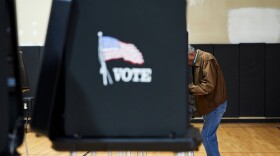Fierce testimony from experts and disenfranchised voters has been delivered in a Winston-Salem courtroom during the first two weeks of a federal trial challenging North Carolina's controversial new voting law.
Among the provisions - lawmakers reduced the number of early voting days and eliminated same day registration. Opponents immediately called the changes discriminatory - aimed at suppressing minority participation. The architects of the bill have yet to explain their motivation, and they don't have to.
The court has heard from experts, more than a dozen people who say they were disenfranchised, as well as a couple of lawmakers. There have been questions about statistics, polling procedures and why Republican legislators passed the controversial law.
"The only reason I can think of is to suppress the vote. It doesn't take a rocket scientist in my book to figure that out," said Henry "Mickey" Michaux, who was first elected to the General Assembly in 1972, and is only the third African-American to ever serve in that body.
This week, he testified about his relationship with Dr. Martin Luther King Jr., the history of voter suppression in North Carolina and how tools like early voting improved black participation. But the Democrat wasn't behind the controversial measure.
His Republican counterparts who were behind the measure haven't testified. They're using legislative immunity, or privilege. It keeps them off the stand, and from having to turn over some emails and documents related to the case.
"I don't think this is a thing legislative privilege should be. I mean here you are talking about a constitutional right. You should not be exercising any kind of legislative privilege trying to protect or diffuse constitutional rights," Michaux said.
According to the legislative library in Raleigh, privilege in North Carolina dates back to 1787 - it's older than the U.S. Bill of Rights. Similar privileges exist across the country and at the federal level.
"Legislators' speeches and debates, with respect to pending legislation cannot be used against them in any other setting," explained Steve Huefner, a professor in the Moritz College of Law at Ohio State University.
"We could have an unlimited number of claims that citizens would bring against their elected representatives, saying 'You didn't represent my interests and now I'm suffering - I wrote to you and I told you that if you voted in favor of this bill it was going to ruin my business, and you voted in favor of this bill and you ruined my business - I want you to pay for my business.'"
Privilege for North Carolina lawmakers is rarely tested in the courts. About 25 years ago, the scope of privilege was narrowed so that legislators could no longer legally speed to and from work. An added wrinkle in these proceedings is that we're talking about invoking state privilege in a federal court.
Ultimately, the presiding judge, Thomas Schroeder, has discretion. He could compel lawmakers to testify and mandate they turn over all documents related to the case. But so far he has not done that. He's a conservative member of the bench nominated by President George W. Bush; and has ruled that in this case privilege protects state lawmakers from having to turn over email correspondence with other legislators, or staff members.
"But that legislative privilege does not attach to email correspondence between legislators and members of the public," added Chris Brook an attorney for the A.C.L.U., one of the plaintiffs in this case.
Legislative privilege has been an obstacle for opponents of the law who are trying to prove it was designed to suppress minority voters.
"I think it's something that as a legal matter we can overcome. I do think it is regrettable that both the plaintiffs and public at large are never going to have a full appreciation of why House Bill 589 was adopted and why it was adopted in such a hurried fashion," Brook said.
The plaintiffs will soon pass this case to the defense, and the state is expected to call rebuttal experts, other state officials and present evidence of its own. The witness stand will remain occupied for a few more days; although those who orchestrated changes to the state voting law will not be testifying about their motivation, intent or justification.








